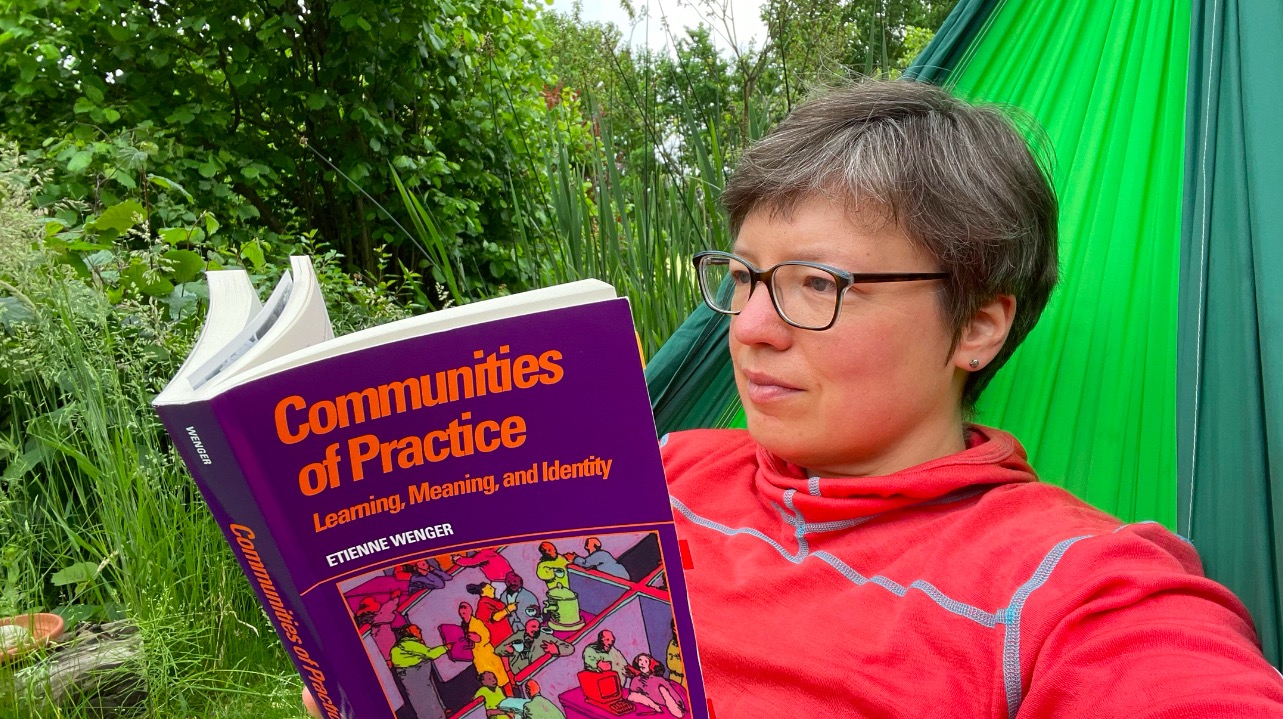
“Systems conveners in complex landscapes” (Wenger-Trayner & Wenger-Trayner, 2014)
If I had to pick one book that has influenced my current thinking about teaching and learning the most, I would pick Wenger’s 1998 “Communities of practice: Learning, meaning, and identity” (link to my summary of the book and some later work on CoPs). What I find really helpful to think about in the CoP framework is that there are many different, but legitimate, roles, that can also — again, legitimately — change over time. The description of one specific role, the “broker”, really spoke to me when I first read the book: Someone who is involved in many different CoPs and facilitates information flow between them. That’s kinda what I have always been doing because that’s what I find most interesting (much more interesting than really digging deep into one topic), without thinking about that being an important contribution to all those CoPs. And now I read another Wenger work which made me realize that while I was probably a broker for many years, maybe now I am on my way of becoming a “systems convener” (Wenger-Trayner & Wenger-Trayner, 2014): “They are dreamers but they are also schemers, with a solid dose of strategic thinking and tactical acuity.”
Systems conveners, according to Wenger-Trayner & Wenger-Trayner (2014), are “people who forge new learning partnerships in complex landscapes” and “spark people’s imagination and open up new aspirations for them”. They do not only bring other individuals together to create new collaborations, but change the larger landscapes of practices, coalitions, institutions, etc.. They have a vision they are pursuing, while at the same time having to co-create this vision with everybody involved in order to get everybody’s buy-in. And it is important that they stick to “only” a vision as compared to having a fixed agenda that they might then be tempted to force on people.
Changing landscapes comes with many challenges that need to be taken on, for example that practices of different CoPs might not only be unrelated, but even competing; that institutions work in very different contexts; that scales that CoPs operate on might be from very local to global; that there might be large power differences between stakeholders; that change takes time and and the same time unrelated changes are happening (like key people quitting their jobs and new people joining, which means that the process might be thrown back substantially and might need to change a lot to bring the new people on board, too).
Additionally, there are boundaries that separate different CoPs — in terms of practices, identities, frameworks, and many other aspects. Systems conveners need to find ways to bridge boundaries and get buy-in from both (or more) sides to figure out shared interests and ways forward without trying to tear down the boundaries (which wouldn’t work). And for it to be effective, the buy-in needs to come from people who are in the right roles in their respective CoPs, too. And for them this is also hard work, because as they open up for conversations across boundaries, they have to negotiate within their CoP and towards their bosses etc that this is a good thing, while also keeping in mind other competing demands, like their own personal perspectives and goals and identities etc..
Systems conveners also need to make sure they bring the right people together — not only people in the right roles with enough power/influence at their respective CoPs, but also with diverse enough approaches. And as they are creating new cooperations and alliances, they need to be aware that this of course involves new and changing power dynamics in the new constellations as well as in peoples’ home CoPs, which the systems conveners need to balance. And with the changes come changing identities for all involved, which is hard work to negotiate both within and between individuals and their networks.
That changes take time is also a double-edged sword: On the one hand, it gives everybody involved time to adapt, on the other hand parameters might change that influence the change process, and also people might get impatient because they aren’t seeing changes happening fast enough. This is also something that systems conveners have to keep in mind and mitigate.
A big role in all of this is held by a shared narrative of the vision, that on the one hand needs to be well thought-through by the systems convener, but on the other hand co-created with all stakeholders so they can identify with it: “The convener’s push for alignment does not displace people’s agendas; on the contrary it embraces these agendas to make them more ambitious, more connected, and in the end more likely to be effective.” And the co-creation aspect is really important to share ownership and thus leadership and engagement.
I found reading this chapter so helpful to understand my own position and where my professional development is leading me, including descriptions of personality traits that systems conveners share, and to also see typical challenges put in writing — becoming aware might help mitigate them, or at least normalize them as a part of the role. This chapter is — in my opinion — the perfect complement to the Kezar and Reinholz works that I read for the iEarth/BioCEED “Leading Educational Change” course two years ago, and even while writing this blog post, I have shared the chapter with a dozen colleagues because I find it so inspiring. This is 100% recommended reading if you are planning to lead any kind of (educational) change!
Wenger, E. (1998). Communities of practice: Learning, meaning, and identity. Cambridge university press.
Wenger-Trayner, B., & Wenger-Trayner, E. (2014). Systems conveners in complex landscapes. In Learning in landscapes of practice (pp. 99-118). Routledge.